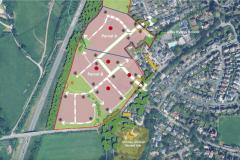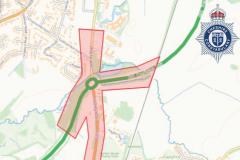
Staff at Hare Hill have welcomed two new members of their team, tasked with improving biodiversity through a unique project, funded entirely by donations.
Jasper and Bolero, two North Swedish Stallions, have been specially drafted in to carry out the work at the National Trust attraction using a new dredging technique which hasn't been used in the UK before.
From now until Tuesday 24th July, the ponds at the garden will be cleared of silt and algae to help the wildlife flourish.
In the past 150 years, six in ten Cheshire ponds have disappeared with many in a very poor state. Ponds play a crucial role in providing a home and feeding ground for a wide range of wildlife. They also help drainage in the garden which would prevent flooding when there's heavy rain.
The ornamental ponds at Hare Hill have the potential to be home for a range of wildlife including great crested newts, dragonflies and damselflies and to have an impact on the habitats of birds and bats.
Treating the problem isn't straightforward at Hare Hill because it's impossible to use the standard heavy machinery required for dredging the garden. Not only does the terrain and large trees make it physically impossible to get the machinery in, the sensitive historic nature of the site also means that this could do irreparable damage.
Head Gardener, Emma Hill, says: "We're thrilled to have started the project which will drastically improve wildlife here at Hare Hill. Over the years we have carried out small scale interventions where we could, but it has felt more like a sticking plaster on the problem rather than a longer-term solution. The silt has now reached a stage where it needs to be cleared urgently to avoid long term damage to biodiversity or putting the garden at an unacceptably high risk of flood damage. This is something man-power alone simply can't do and we're excited to have found an ecological solution."
In summer 2016 a new approach to dredging was tested at Hare Hill, kick-starting the work now taking place. Rosco, a Belgian Ardennes stallion from Cumbria was drafted in to help dredge one of the ponds at Hare Hill. Little did Rosco know that he was at the forefront of a new technological breakthrough.
Using his mighty strength, Rosco pulled a specially designed cage, known as a 'shuttle,' through the water which caught the silt as it travelled. The trial was successful in removing an overwhelming amount of silt, improving the water quality and wildlife habitat overnight, whilst causing minimal damage to the ponds, paths and wider garden.
Emma said: "We were delighted with the trials and we loved being able to share the unique project with our visitors who came to watch Rosco at work. We knew we'd found a solution, but work like this is costly and we were now faced with another dilemma; how were we going to fund it?"
In 2017 a campaign was launched to raise £25,000 which would fund two working horses for the garden team at Hare Hill to dredge the three remaining ponds. Thanks to generous donations from local people and visitors the full amount was raised and the work is now set to take place over the next month.
Simon Lenihan, from Ecological Logging in Cumbria says: "This is the first time our heavy horses have been used in this way. I'm enjoying working alongside them to harness their logging experience to help with a different aspect of wildlife conservation at the National Trust attraction. Sadly, Rosco won't be joining us due to his retirement last year, but he's handed-over the reins to Jasper and Bolero who are doing a brilliant job."
Once the dredging is complete plants will be introduced to recreate the ornamental design intended by Colonel Brocklehurst, the original owner. This will also give biodiversity a kick-start by attracting the variety of wildlife required for a healthy pond habitat.
Emma said "People can visit and see this trailblazing conservation work in action, and find out about the wildlife that thrives in a healthy pond. We're excited to see the results of the project at Hare Hill and the wider positive impacts on biodiversity at places where this technique could be used to solve similar problems."








